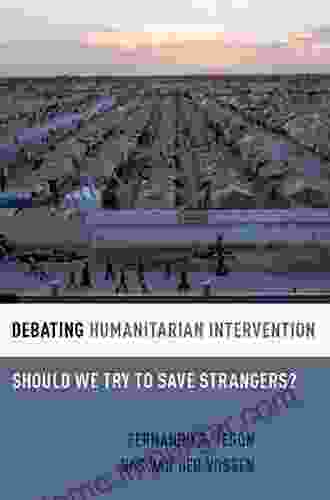Should We Try to Save Strangers? Debating Ethics

Throughout history, philosophers and ethicists have grappled with the question of whether we have a moral obligation to save strangers in life-threatening situations. This debate has only intensified in recent years, as our interconnected world has made us increasingly aware of the suffering of others, even those we do not know.
5 out of 5
| Language | : | English |
| File size | : | 1283 KB |
| Text-to-Speech | : | Enabled |
| Screen Reader | : | Supported |
| Enhanced typesetting | : | Enabled |
| Word Wise | : | Enabled |
| Print length | : | 288 pages |
| Lending | : | Enabled |
In this article, we will explore the ethical arguments for and against the duty to rescue strangers. We will consider the implications of our actions (or inaction) for both the victim and society as a whole. We will also examine the psychological and emotional factors that can influence our decisions in these situations.
The Duty to Rescue
The most common argument in favor of the duty to rescue is that we have a moral obligation to prevent harm to others. This obligation is based on the principle of beneficence, which holds that we should act to promote the well-being of others. In the case of a stranger in danger, the most direct way to promote their well-being is to save them from harm.
Some philosophers argue that the duty to rescue is even more stringent than the duty to avoid harming others. They contend that we have a positive obligation to help those in need, even if it involves some risk or inconvenience to ourselves. This view is based on the principle of non-maleficence, which holds that we should not cause harm to others.
Arguments Against the Duty to Rescue
While the duty to rescue is a compelling ethical principle, there are also several arguments that can be made against it. One common argument is that we cannot be held responsible for the actions of others. If a stranger is in danger, it is not our fault, and we should not be obligated to put ourselves at risk to save them.
Another argument against the duty to rescue is that it can be impractical or even impossible to help in some situations. For example, if a stranger is drowning in a fast-moving river, it may be too dangerous for us to try to rescue them. In such cases, it may be more ethical to call for help from emergency responders.
The Bystander Effect
One of the most challenging aspects of the duty to rescue is the bystander effect. This phenomenon occurs when multiple people witness an emergency but fail to take action. The bystander effect is often attributed to factors such as diffusion of responsibility (the belief that someone else will help),fear of embarrassment, and fear of being held liable.
The bystander effect can have devastating consequences. In one study, researchers found that the presence of even a single bystander can reduce the likelihood of someone helping a victim by 50%. This suggests that we need to be aware of the bystander effect and take steps to overcome it.
The Trolley Problem
One of the most famous thought experiments in ethics is the trolley problem. In this experiment, you are presented with a hypothetical situation in which a runaway trolley is about to hit five people tied to the tracks. You are standing next to a lever that can divert the trolley to a different track, where it will hit only one person. Would you pull the lever?
The trolley problem raises a number of ethical questions, including the question of whether we have a duty to sacrifice one person to save five. The trolley problem has no easy answer, and it has been debated by philosophers and ethicists for decades.
The question of whether we have a moral obligation to save strangers is a complex one. There are strong arguments to be made on both sides of the issue. Ultimately, the decision of whether or not to rescue a stranger is a personal one. However, it is important to be aware of the ethical arguments and to consider the implications of our actions (or inaction) before making a decision.
In today's interconnected world, it is more important than ever to be mindful of our duty to others. We should all strive to be the kind of people who are willing to help a stranger in need, even if it involves some risk or inconvenience to ourselves.
5 out of 5
| Language | : | English |
| File size | : | 1283 KB |
| Text-to-Speech | : | Enabled |
| Screen Reader | : | Supported |
| Enhanced typesetting | : | Enabled |
| Word Wise | : | Enabled |
| Print length | : | 288 pages |
| Lending | : | Enabled |
Do you want to contribute by writing guest posts on this blog?
Please contact us and send us a resume of previous articles that you have written.
 Book
Book Novel
Novel Page
Page Chapter
Chapter Text
Text Story
Story Genre
Genre Reader
Reader Library
Library Paperback
Paperback E-book
E-book Magazine
Magazine Newspaper
Newspaper Paragraph
Paragraph Sentence
Sentence Bookmark
Bookmark Shelf
Shelf Glossary
Glossary Bibliography
Bibliography Foreword
Foreword Preface
Preface Synopsis
Synopsis Annotation
Annotation Footnote
Footnote Manuscript
Manuscript Scroll
Scroll Codex
Codex Tome
Tome Bestseller
Bestseller Classics
Classics Library card
Library card Narrative
Narrative Biography
Biography Autobiography
Autobiography Memoir
Memoir Reference
Reference Encyclopedia
Encyclopedia Mark R Pitkin
Mark R Pitkin Bill Thompson
Bill Thompson Jan Johnsen
Jan Johnsen Bernice Bronia Grunwald
Bernice Bronia Grunwald Barbara J Hemphill
Barbara J Hemphill Denise C Hodges
Denise C Hodges Yaakov Astor
Yaakov Astor Faith Salie
Faith Salie Bernard Leo Remakus
Bernard Leo Remakus Bea Wehrly
Bea Wehrly Bernard Reginster
Bernard Reginster John K Coyle
John K Coyle Bernard S Black
Bernard S Black Bikramjit Basu
Bikramjit Basu Sheridan Hill
Sheridan Hill Molly Hinton
Molly Hinton Giacinto Cerviere
Giacinto Cerviere Beverly Tetterton
Beverly Tetterton Brian Besong
Brian Besong Ji Tao Wang
Ji Tao Wang
Light bulbAdvertise smarter! Our strategic ad space ensures maximum exposure. Reserve your spot today!

 Gerald ParkerCompulsory Purchase and Compensation: An Invaluable Guide for Landowners and...
Gerald ParkerCompulsory Purchase and Compensation: An Invaluable Guide for Landowners and...
 Darren NelsonUnlock the Ultimate Guide to Navigating Life as a Modern Man with "Bro On The...
Darren NelsonUnlock the Ultimate Guide to Navigating Life as a Modern Man with "Bro On The... Jeffrey CoxFollow ·17.6k
Jeffrey CoxFollow ·17.6k Chase SimmonsFollow ·17.4k
Chase SimmonsFollow ·17.4k Ethan GrayFollow ·18.9k
Ethan GrayFollow ·18.9k Robin PowellFollow ·3.7k
Robin PowellFollow ·3.7k Emanuel BellFollow ·7.9k
Emanuel BellFollow ·7.9k Cameron ReedFollow ·17k
Cameron ReedFollow ·17k Raymond ParkerFollow ·6.4k
Raymond ParkerFollow ·6.4k Connor MitchellFollow ·9.5k
Connor MitchellFollow ·9.5k

 Edison Mitchell
Edison MitchellFrench Strategy and Operations in the Great War
An In-Depth Examination of Military Genius ...

 Harvey Hughes
Harvey HughesArts In Health: Designing And Researching Interventions
Delving into the...

 Walt Whitman
Walt WhitmanHealing and Hope for Those with Empty Arms
A Comprehensive Guide for Grieving...

 DeShawn Powell
DeShawn PowellUniversity of Maine Ice Hockey: A Legacy of Frozen Glory
Nestled in the heart of Maine, a state...

 George Hayes
George HayesControl For Aluminum Production And Other Processing...
In today's competitive manufacturing...

 Ben Hayes
Ben HayesThe Lost Obelisks Of Egypt: A Journey into the Depths of...
: The Enduring Allure of Egypt's Ancient...
5 out of 5
| Language | : | English |
| File size | : | 1283 KB |
| Text-to-Speech | : | Enabled |
| Screen Reader | : | Supported |
| Enhanced typesetting | : | Enabled |
| Word Wise | : | Enabled |
| Print length | : | 288 pages |
| Lending | : | Enabled |








